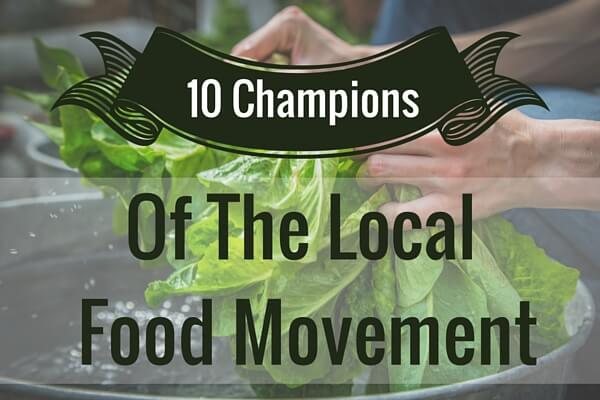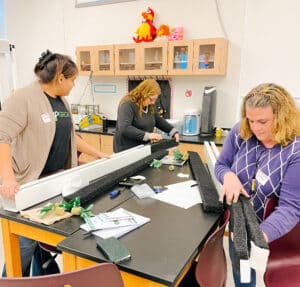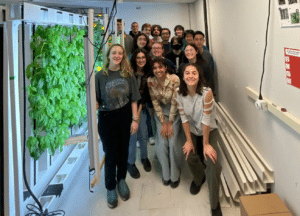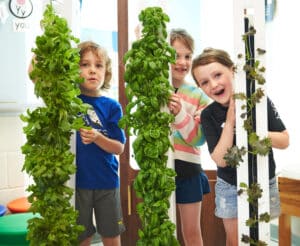Behind the local and urban food movement stand hundreds of people, each adding their own unique momentum. This is a cross section of the most influential people in local food and organic agriculture.
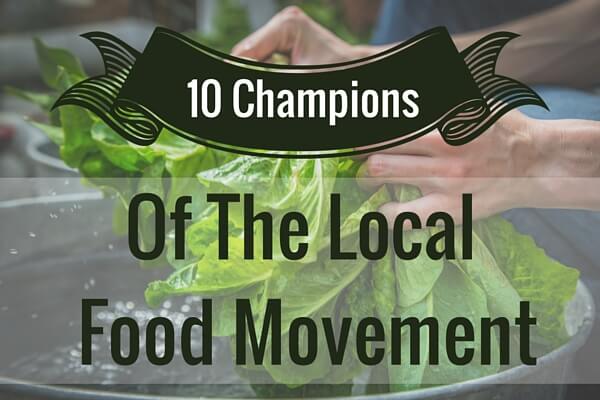
From urban farms in the city, to activists and writers, to farmers and policy activists, from big names to less well known names, each of these people contributes something to a brighter future of food.
Kimbal Musk – The Kitchen
One of the people who is working to change the food system from the inside is Kimbal Musk. Musk is trained as a chef, so he understands the realities of sourcing food on a daily or weekly basis. This expertise has helped launch The Kitchen family of restaurants; eight restaurants that are redefining food and culture across the country.
This commitment to local food also inspired Musk to launch The Kitchen Community, a nonprofit that facilitates learning gardens in schools across the country. The effort now reaches 125,000 school kids daily, and facilitates a broad range of learning and play around growing food.
Always a good day when that day includes a #LearningGarden install. #LosAngeles #RealFood.
A photo posted by Kimbal Musk (@kimbalmusk) on
The result is more than healthy and tasty food. The result is a community that celebrates food, that eats together, and that invests in its children together. That is inspiring. Thank you Kimbal for all your work. Find Kimbal on Twitter or Instagram.
Erin Sullivan White – Community Food Lab
Erin Sullivan White is the Founder of Community Food Lab, a design-and-planning firm that is behind some of the local food success stories in Durham, NC.
White has experience as a framing carpenter, a chef, and an architect, which might make him the triple threat of local food expertise. Add to that his passion for community building and you have a winning combination.
Some success stories include the Bull City Cool food hub and the Durham Public Schools HUB Farm. Bull City Cool will help to connect growers with local consumers by providing a cold storage and distribution facility.
The HUB school farm is a working CSA that sees up to 300 K-12 students during a typical school day. This facility will introduce a new generation of students to the techniques for growing food.
“I believe that what I am doing, along with many in the food movement, is revolutionary and as such overwhelming to think about in full too often. The food movement, to me, is about shifting our entire global system – that scale of problem can be paralyzing. But what empowers me to act, what motivates me to make change in that system is the idea that big change can start with one garden, or one new relationship, or one meal. Gardening, making relationships, and sharing food are some of my favorite things.”
While these projects depend on solid community efforts from all the stakeholders, it doesnt hurt to have a champion like White on your side. Great work Erin!
Find Erin on Twitter or Instagram.
Danielle Nierenberg – Food Tank
Danielle Nierenberg may be best known for her work with The Food Tank, one of the most recognized food advocacy groups around. Nierenberg began her advocacy as a Peace Corps volunteer in Dominican Republic, and only seems to have gained momentum since then. It is always hard to describe someone elses passion, so I reached out and asked her what motivates the work she is doing. She responded:
“Who motivates me? The 500 million family farmers who are developing innovations in fields, kitchens, and classrooms across the world and finding ways to alleviate hunger, obesity, food loss and waste, and poverty while also protecting the environment.”
Food is something we all understand, and thats why the Food Tanks work is so valuable. Thank you Danielle!
Find Danielle on Twitter or Instagram.
Joel Salatin- PolyFace Farms
If you dont know Salatin, just remember he may be the only farmer to quote the book of Hosea in a speech to Google employees. Salatin, a self described Christian-libertarian-environmentalist- capitalist-lunatic-Farmer, may be best known for his work at PolyFace farms, which was featured in the documentary Food, Inc. (available on Netflix).
(If you want to see how a well run farm slaughters its chickens, that clip can be found at minute 46:00.)
Joels books talk about the realities of farming, not just the how-to, but the why.
Joel is a powerful speaker who gives us a sense of farm life. His speaking and writing have reached a generation of people who want to understand – and participate in – their local food economy.
Salatin also packs a punch, having stood up to the USDA through at least one regulatory scuffle. With books like Everything I Want To Do Is Illegal: War Stories From the Local Food Front, and Family Friendly Farming.
It is well known that the farming community is full of rebels and independent spirits, which is exactly what we need if we are going to launch a revolution. Salatins speeches and his numerous, well written books have inspired a generation to experience what he calls the sheer ecstasy of being a lunatic farmer. Thanks Joel for all of your hard work.
JD Sawyer- The Aquaponics Source
Fish have been paired with vegetables since at least the story of Squanto. but it has taken 200 years for the idea to catch on. Enter JD Sawyer. JD lost his job during the recession. After seeing an aquaponics installation, he and his wife Tawnya began looking into the techniques as a possible business.
Together with his family, they identified three goals for going forward: feed their family, give back to the community and create a sustainable business.
Since 2008, JD has been active in the Aquaponics Community. One of his first projects was helping to build a facility in an area of Denver that was considered a food desert. The timing was excellent, since the aquaponic community has been exploding in the last ten years.
Since then, he has been a pillar of the AP community. Sawyer recently took over the reins at The Aquaponic Source, a community of practitioners pioneered by Sylvia Bernstein.
The result is a community of 16,000+ people who are passionate about growing food in all kinds of environments, without using chemical fertilizers. Thanks JD! We at Bright Agrotech appreciate all your hard work!
Wally Satzewich- SPIN Farming
Satzewich earned a spot on this list for what he calls SPIN farming – Small Plot INtensive farming. Thirty years ago, Satzewich bought twenty acres of farm land, invested in an irrigation system, and hired a work crew. His farm land was located outside of Saskatoon, which is the largest city in the Canadian province of Saskatchewan.
He quickly found that he was farming high value crops like carrots, spinach, and salad mix on his small backyard plot, while he was able to grow low value crops like potatotes and onions on his farm land. What was notable was that he was earning similar bottom line profits for each of the operations.
The reasons were simple: he could irrigate using a city water tap, he did not have to hire outside labor, and there were fewer pests and deer to eat the food. This insight led him to develop the framework for Small Plot INtensive Farming models, or SPIN. The guides are available to purchase as PDF downloads.
In an interview with Seedstock, SPIN co-founder Roxanne Christensen says:
This kind of good food movement cant be controlled, co-opted or sold out because it makes agriculture accessible to anyone, anywhere, she said. It is giving rise to a whole new farming class that cuts across geography, generations, incomes and ideologies and that is comprised of serious business people dedicated to producing needed products.
Having struggled through a farm startup in Kansas City, I can attest to the need for this financially savvy farming advice. Thank you Wally!
If you dont have kids, you might be forgiven for not knowing what they eat at school. My 6 year old came home the other day and announced that the ketchup at school is watery. I immediately recalled the buffet lunches that I was served as a primary school stu
Anupama Joshi – Farm to School network.
Thats why I am thankful for the work of the Farm to School coalition, a network that connects 23.5 million children to healthy local food provided – as much as possible – by local farmers. The farm to school network also is working to bring gardens into the school, and to provide resources for education.
These efforts are championing farm foods in a processed food world. Our kids are better off for it. Thank you Ms. Joshi!
Find Farm to School on Twitter.
Wendell Berry
As Coby Gould, director of the Grow Haus, puts it: the root word of agriculture is culture. And few people have been more instrumental in showing the world what healthy culture looks like than Wendell Berry. After an early stint as an English professor at NYU, he returned to the family farm in Henry County, Kentucky at the age of 31.
His writings have featured a strong orientation and argument for the land ever since. Berry was politically active from early in his career, and was one of the first widely read activists to link his faith with his environmental actions. He made a statement against the Vietnam War in 1968, and has since become one of the most revered thinkers in western civilization.
Historian Richard White says Berry is “the environmental writer who has most thoughtfully tried to come to terms with labor” and “one of the few environmental writers who takes work seriously.” Enough said. Thank you Professor Berry, sir, for your contribution to healthy families and healthy economies.
Willie Nelson – Farm Aid Network
If you ask me, one show I would have wanted to see was the 1985 Farm Aid tour. It was epic. Van Halen on the same stage with Tom Petty. Merle Haggard backstage with Johnny Cash. Foreigner and the Beach Boys! But there is a sad reality behind the Farm Aid tour.
“The original purpose of Farm Aid was to bring awareness to the fact that the farmer was in trouble.” -Willie Nelson
And they have done that. Among their many accomplishments, Nelson and his merry band of rockers have a string of successes behind them, including $9 million in fundraising from the first show alone.
Neil Young took out a full page ad in USA Today protesting the Reagan administrations lack of support for family farmers. Nelson and Young then brought family farmers in to testify before Congress on the state of the family farm, leading to the Agricultural Credit Act of 1987.
15 years later and @farmaid is still #FightingTheGoodFight for local farmers! #30thAnniversary A photo posted by Willie Nelson (@willienelsonofficial) on
In a rare phone interview for Grist, Darby Minow Smith asked who Willie’s favorite food writers were. Willie responded: I was raised up with farmers and I have a lot of friends who were and are farmers. I think thats where you go to get advice about whats going on out there: You go ask a farmer.
That’s good advice.

